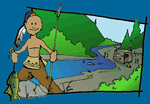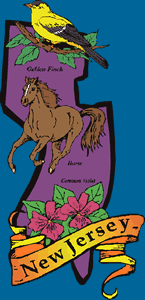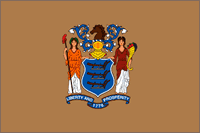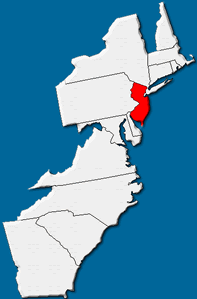


Geography and Landforms:
New Jersey is the 5th smallest state. It is surrounded by water, except for its 50-mile northeast boundary with New York. The state has a 130-mile coastline with the Atlantic Ocean. Many popular beaches and resorts are located here. Just west of the coastal area are the Pine Barrens, a region of dense forests and small rivers.
|
 History:
The first white man to explore the region that became New Jersey was the Italian navigator Giovanni Verrazano. He reached the coast of New Jersey in 1624. But the Dutch were the first to claim ownership primarily because of the voyages of Henry Hudson, an English sea captain who was employed by the Netherlands. Hudson sailed into Newark Bay in 1609. Soon the Dutch had established small trading colonies on the sites of present day Hoboken, Jersey City, and Gloucester City. Dutch trading ships visited these settlements throughout the 1600s.
|
 Economy:
New Jersey has been a leader in industry since Thomas Edison established his research laboratory in Menlo Park in 1876. The color television and videotape recorder were both invented in New Jersey research facilities. The state continues to be a leader in technology.
|
 First Inhabitants:
The first inhabitants of New Jersey were part of the Delaware tribe of Algonkian Indians. They called themselves the Leni Lenape, which means "original people."
|
Books Related To New JerseyBack in Time with Thomas Edison - Dan Gutman The Book of One Hundred Truths - Julie Schumacher Callie's Rules - Naomi Zucker Center Field - Robert Lipsyte G is for Garden State: A New Jersey Alphabet - Eileen Cameron Penny from Heaven - Jennifer Holm A Ride into Morning: The Story of Tempe Wick - Ann Rinaldi War and Watermelon - Rich Wallace |
Famous Citizens:
|
| Capital: | Trenton |
| Entered Union: | December 18, 1787 |
| Population: | 8,938,175 |
| Area | 8,721 |
| Bird | Eastern Goldfinch |
| Flower | Violet |
| Nickname: | Garden State |
| Governor | Chris Christie |
Places to Visit in New Jersey: (Click the links to learn more.)
|



